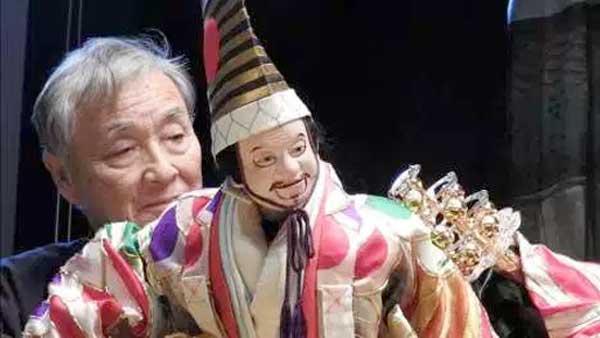Renowned Japanese puppet troupe performs at Furman

As part of a rare visit to North America, the celebrated Tonda Ningyô Jôruri Puppet Theater traveled to Furman University for a one-night performance of traditional Japanese puppetry on March 22 in McAlister Auditorium on campus.
The puppet performance is the keynote event for Furman’s first Mini-Japanese Festival of Traditional Japanese Performing Arts, which is co-sponsored by the university’s Asian Studies, Theatre Arts and Music departments and Upstate International of Greenville. The festival is also supported by Furman’s Humanities Development Fund and Fine Arts Initiative, the Duke Endowment and the A.S. Reid Endowed Lecture Fund.
Yuji Kishimoto, Professor Emeritus of Architecture at Clemson University, serves as festival organizer.
Director Hidehiko Abe and nine other members of the Tonda Ningyô Jôruri Puppet Theater, based in Nagahama, Japan, will perform three bunraku plays from the 18th and 19th century using nearly life-size puppets manipulated by a puppet master and assistants who are clothed in black and in full view of the audience.
Dating to the late 17th century in Osaka, Japan, bunraku showcases master puppeteers, chanters and shamisen musicians in a display of classic storytelling artistry that takes performers decades to master. Some of the puppets used by the Tonda troupe are more than 200 years old.
“We are honored to host these highly-skilled artists for their first visit to South Carolina during Upstate International Month,” says Furman Professor Shusuke Yagi, chair of Furman’s Asian Studies Department. “Their performance will be a truly unique intellectual and cultural experience that should not be missed.”
The Tonda troupe, founded in the 1830s, tours regularly in Japan and instructs middle school, high school and college-age students in the art of traditional Japanese puppetry. During their stay, they will also conduct puppetry workshops for Furman students. The troupe has been designated as an Intangible Cultural Treasure and performs in its own theatre built in 1991 by the Shiga Prefectural government. Abe, the troupe’s director, traces his ancestry back seven generations to one of the founding troupe members.
“American plays have evolved dramatically over the past 100 years,” says Furman Professor and Theatre Arts Department Chair Jay Oney. “Bunraku, however, is an art form that has been preserved for more than 300 years. Furman and the Greenville communities will have an opportunity to see masters performing a traditional puppet play, to experience what is essentially an artistic time capsule.”
Prior to the troupe’s performance, the university will host performances of other traditional Japanese arts including archery, dance, sushi making, sumi-e brush painting, and a tea ceremony from 3-5 p.m., Tuesday, March 22.
For more information, contact Furman’s News and Media Relations office at 864.294.3107.
About the performance
“The Dance of Sanbaso,” first staged in 1859, is a light-hearted play wishing peace and prosperity for all, and is often performed at the opening of a theatrical season or at the beginning of a new year. The second play, “Keisei Awa no Naruto,” which premiered in 1768, is the story of a missing treasure sword and the tragic story of a mother and daughter from a samurai clan. The third play, “Date Musume Koi no Higanoko,” was first performed in Osaka in 1773 and was adapted from a true story of a girl who sacrificed herself to save her lover. Plays are designed for mature audiences.